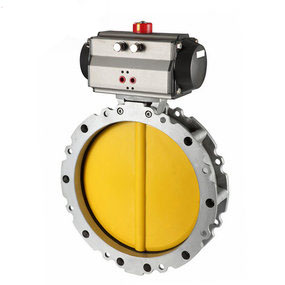Pneumatic butterfly valves are classified according to the driving mode
(1) Pneumatic butterfly valve refers to the valve that does not need external drive but is actuated by the energy of the medium. For example, safety valve, pressure reducing valve, steam trap, check valve, automatic control valve, etc.
(2) Pneumatic butterfly valve: electric valve can be driven by various power sources. Electric valve: electric valve. Pneumatic valve: a valve driven by compressed air. Hydraulic valve: A valve actuated by the pressure of a liquid, such as oil. In addition, there are combinations of the above driving methods, such as pneumatic electric valve.
(3) Pneumatic butterfly valve: the manual valve controls the action of the valve manually through the handwheel, handle, lever and sprocket. When the opening and closing torque of the valve is large, the gear or worm gear reducer can be set between the hand wheel and the valve stem. If necessary, the universal joint and drive shaft can also be used for remote operation. To sum up, there are many ways to classify valves, but they are mainly classified according to their role in the pipeline. General valves in industrial and civil engineering can be divided into 11 categories, namely gate valve, globe valve, plug valve, ball valve, butterfly valve, diaphragm valve, check valve, throttle valve, safety valve, pressure reducing valve and drain valve. Other special valves, such as instrument valves, valves of hydraulic control pipeline system, valves of various chemical machinery and equipment bodies, etc.

